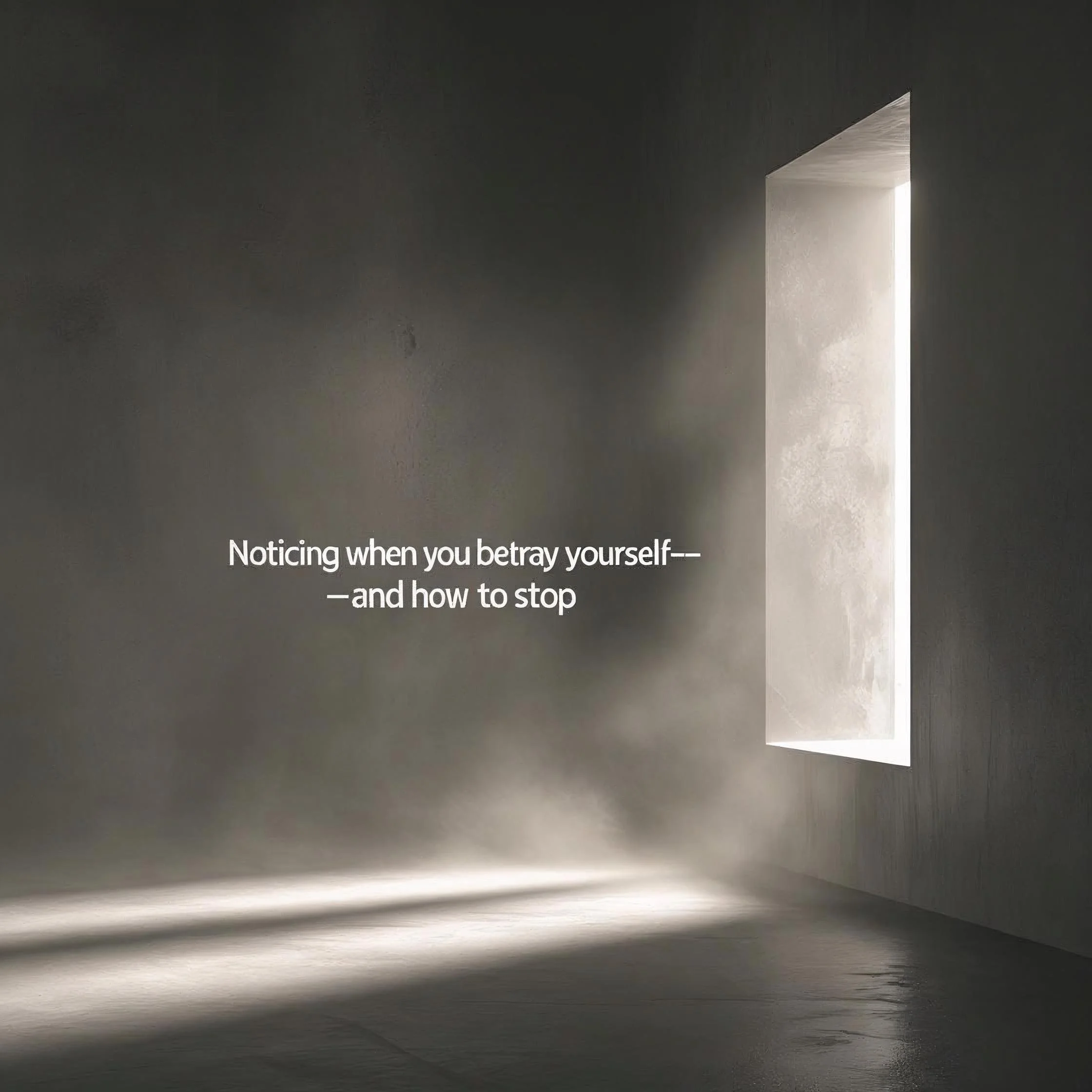Noticing When You Betray Yourself— And How to Stop
Have you ever walked away from a conversation or situation with a strange ache in your chest or a quiet sense of regret in your gut? Maybe you said yes when every cell in your body wanted to say no. Maybe you stayed silent when your truth was begging to be spoken. These quiet moments of internal conflict are often signs of something deeper—self-betrayal.
Self-betrayal happens in small, almost imperceptible ways over time. And most of us have been trained to do it, especially those of us raised to be polite, accommodating, or to keep the peace at any cost. But the longer we live disconnected from our own needs, boundaries, and truth, the more exhausted, resentful, or even depressed we can become.
Let’s talk about how to recognize the signs of self-betrayal, why we do it, and how to begin healing this pattern with empathy and protection—for yourself.
What Is Self-Betrayal?
Self-betrayal is when we go against our own values, needs, feelings, or intuition to meet the expectations or comfort of someone else. It’s not always dramatic. In fact, it often hides behind seemingly “nice” behavior:
Smiling when you’re seething inside
Agreeing to help when you’re overwhelmed
Not speaking up when something feels wrong
Prioritizing others’ emotions while ignoring your own
We betray ourselves when we make others more important than our own well-being. This doesn't mean we can’t be generous or compassionate—it means we stop abandoning ourselves in the process.
Why We Betray Ourselves
Most self-betrayal starts early. We’re praised for being good, obedient, and selfless. We learn that expressing needs is “needy,” that anger is “bad,” and that keeping others happy earns us love or safety.
As adults, these messages shape how we show up in relationships, friendships, workplaces, and even our spiritual communities. We may start people-pleasing, suppressing our needs, or excusing bad behavior just to avoid conflict or rejection.
Here’s the truth: You don’t owe anyone your silence, comfort, or peace of mind. Not even the people you love. Especially not the people who have shown you they don’t respect your boundaries.
How to Recognize You’re Betraying Yourself
Here are some signs you might be betraying yourself:
You constantly feel drained after spending time with someone
You ignore your gut feeling and talk yourself out of it
You say “it’s fine” when it’s not
You over-explain or justify your boundaries
You feel guilty when you put yourself first
You tolerate behavior that crosses your limits
You resent people but don’t know why
If any of this hits home, you’re not alone. And you’re not broken. You’re waking up to the places where your kindness has been turned against you.
The Cost of Self-Betrayal
Every time we betray ourselves, we chip away at our self-trust.
That’s why self-betrayal can lead to anxiety, burnout, disconnection from your intuition, and even physical symptoms like fatigue or tension. Over time, we start to feel like we don’t know who we are anymore because we’ve spent so long being who others wanted us to be.
The antidote? Coming home to yourself.
You Can Be Empathic and Protective
You don’t have to choose between being a good person and protecting your peace. Real empathy doesn’t require self-abandonment. It’s possible to be loving and direct, to hold space for others without absorbing their chaos, to be supportive without losing yourself.
You can say:
“That doesn’t work for me.”
“I need time to think about that.”
“I’m not comfortable with this conversation.”
“I care about you, but I need to care for myself right now.”
Protecting yourself doesn’t make you cold or selfish—it makes you sovereign.
How to Stop Betraying Yourself
Here are a few ways to begin the healing:
1. Check in with your body
Your body tells the truth. When something feels off, notice it. Tension in the chest, a lump in your throat, or tightness in your gut can signal self-betrayal. Don’t dismiss those signs. Pause and ask, “What am I feeling right now? What do I need?”
2. Give yourself permission to matter
You are allowed to have boundaries, desires, and limits—even if it disappoints someone. Reassure your inner child: “It’s safe to say no now. You’re not bad. You’re allowed to choose you.”
3. Practice small, brave steps
You don’t need to blow up your life to reclaim yourself. Start small: decline an invitation, speak your truth in a safe setting, let the phone go to voicemail when you’re tired. Each act of self-honoring builds your confidence.
4. Write a “no more” list
Grab a journal and write: “I will no longer betray myself by…” and let your truth pour out. Include patterns, relationships, or behaviors that you’re ready to release.
5. Create an inner protector
Imagine a fierce, wise part of you that steps in when you feel tempted to abandon yourself. This inner protector reminds you: “You’re worth protecting, even from people you love.”
You Are Worth Defending
You don’t need to shrink, silence yourself, or carry the emotional weight of others to be lovable.
The most radical, healing act you can do is to choose yourself—again and again. That doesn’t mean closing your heart. It means honoring your own heart just as much as you care for others.
Let today be the day you stop apologizing for existing. Let it be the day you say, “I will not betray myself to belong.”
Because the truth is: you already belong—to yourself.
And that’s more than enough.
Want support in practicing self-protection with compassion?
We have a free worksheet called I Choose Me Self-Honoring Worksheet or join our mailing list for tools, meditations, and spiritual support to help you live with integrity, power, and kindness.
You are worth protecting. You are worth keeping. You are worth loving—by you.

